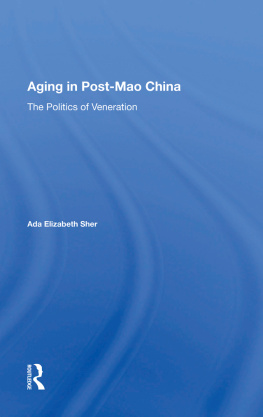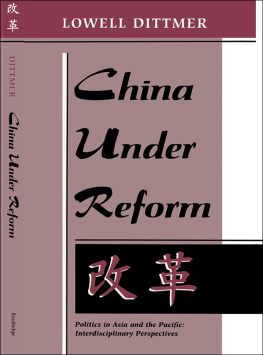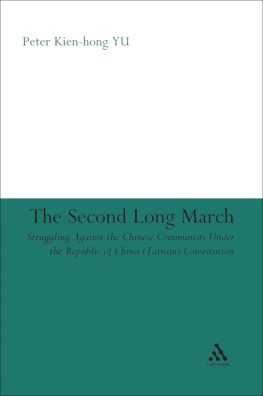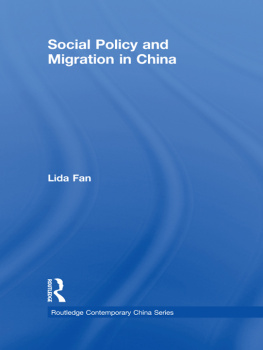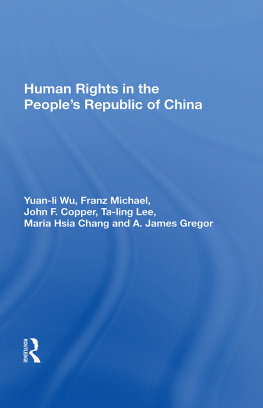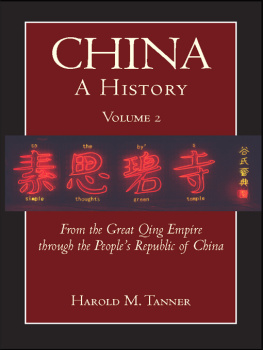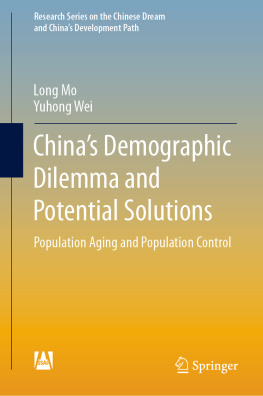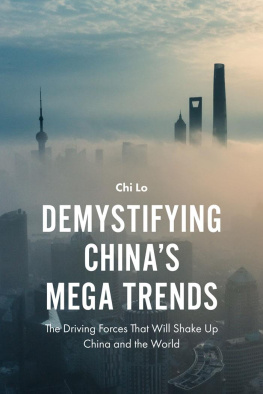Aging in Post-Mao China
Westview Replica Editions
The concept of Westview Replica Editions is a response to the continuing crisis in academic and informational publishing. Library budgets for books have been severely curtailed. Ever larger portions of general library budgets are being diverted from the purchase of books and used for data banks, computers, micromedia, and other methods of information retrieval. Interlibrary loan structures further reduce the edition sizes required to satisfy the needs of the scholarly community. Economic pressures on the university presses and the few private scholarly publishing companies have severely limited the capacity of the industry to properly serve the academic and research communities. As a result, many manuscripts dealing with important subjects, often representing the highest level of scholarship, are no longer economically viable publishing projectsor, if accepted for publication, are typically subject to lead times ranging from one to three years.
Westview Replica Editions are our practical solution to the problem. We accept a manuscript in camera ready form, typed according to our specifications, and move it immediately into the production process. As always, the selection criteria include the importance of the subject, the work's contribution to scholarship, and its insight, originality of thought, and excellence of exposition. The responsibility for editing and proofreading lies with the author or sponsoring institution. We prepare chapter headings and display pages, file for copyright, and obtain Library of Congress Cataloging in Publication Data. A detailed manual contains simple instructions for preparing the final typescript, and our editorial staff is always available to answer questions.
The end result is a book printed on acid-free paper and bound in sturdy library-quality soft covers. We manufacture these books ourselves using equipment that does not require a lengthy make-ready process and that allows us to publish first editions of 300 to 600 copies and to reprint even smaller quantities as needed. Thus, we can produce Replica Editions quickly and can keep even very specialized books in print as long as there is a demand for them.
About the Book and Author
Aging in Post-Mao China: The Politics of Veneration
Ada Elizabeth Sher
The notion that the Chinese respect the elderly is a well-known cultural stereotype, yet little is known about the extent to which this tradition has survived the sweeping political, social, and economic changes of the past thirty-five years. This case study of Shenyang, the industrial capital of Liaoning Province, explores what it means to be old in the People's Republic of China, especially in terms of religious and ethical traditions, education, health, and current political, economic, and employment trends. Dr. Sher bases her assessments on interviews conducted with elderly members of the community; on observations made of old people at work, at home, and around the city; and on detailed discussions about family relations and the aged with workers from a major iron and steel company. What she reports is largely a success story--for this is one area of which the Chinese are justifiably proud. Nevertheless, the book raises important questions about whether the special status of the elderly can be maintained in the wake of major demographic changes and China's instensive drive toward modernization.
Dr. Sher, vice president of Rural Education and Development, has conducted intensive field work in the People's Republic of China, first as a member of a specialized health study tour during the summer of 1982 and then as a visiting faculty member at the Northeast Institute of Technology in Shenyang.
Aging in Post-Mao China
The Politics of Veneration
Ada Elizabeth Sher
Foreword by Victor W. Sidel and Ruth Sidel
First published 1984 by Westview Press
Published 2019 by Routledge
52 Vanderbilt Avenue, New York, NY 10017
2 Park Square, Milton Park, Abingdon, Oxon OX14 4RN
Routledge is an imprint of the Taylor & Francis Group, an informa business
Copyright 1984 by Taylor & Francis
All rights reserved. No part of this book may be reprinted or reproduced or utilised in any form or by any electronic, mechanical, or other means, now known or hereafter invented, including photocopying and recording, or in any information storage or retrieval system, without permission in writing from the publishers.
Notice:
Product or corporate names may be trademarks or registered trademarks, and are used only for identification and explanation without intent to infringe.
Library of Congress Catalog Card Number: 84-51527
ISBN 13: 978-0-367-01729-3(hbk)
To all those who have shared their lives with me, in appreciation
The elderly, as is well known, have played a central role in Chinese life for thousands of years. In pre-Revolutionary China, in contrast to many other societies, older people had considerable prestige and power in the community and particularly within the family unit. Workers and peasants who had little power in the larger society exercised their authority at home and while authority was for the most part in the hands of men, particularly outside the home, women who had lived most of their lives as powerless pawns finally gained some measure of authority within the home as they grew older, when they took on the role of "mother-in-law." It was the elderly who made the fundamental decisions about family life and the demonstration on the part of tJtte young to the elderly of reverence, respect and often fear was an accepted and central ritual of daily life. As the linchpin of the family, the elderly were, of course, mirroring the structure of the larger society: the patriarchal, often cruel, authoritarianism of traditional China was replicated and supported by a patriarchal, often cruel, authoritarian family structure.
Since the dominant position of the elderly in pre-Revolutionary China was inextricably connected with the maintenance of a hierarchical society in which not only power but also income, goods and services were largely reserved for the elite, the question of what has happened to the elderly in post-Revolutionary China becomes a key factor in understanding the structure and fabric of the society today. While frequent shifts in policy have characterized the 35 years since the founding of the People's Republic, one principle has remained fairly constant: the attempt by the leadership in many areas of Chinese life to turn the society on its head, to reverse the former power structure, to reject the old priorities and formulate new ones. In health care, according to the four principles enunciated by Mao Zedong in 1950, services were to be provided first not to the elite who formerly received the bulk of high quality medical care but rather to the "workers, peasants and soldiers." Women were to take their rightful place in society and to "hold up half the sky." Landlords were overthrown and their land and power turned over to the peasants. In this context, what has happened to the elderly, those who held such a grip on power in traditional China?
From studies published during the 1970s and from the observation of many visitors, it has become clear that while older people in China no longer retain their unquestioned, autocratic role within the family and within Chinese society, they nevertheless do have a respected, often honored status in the New China. While they have lost some of their power to determine directly the lives of others, they retain roles that utilize the traditional respect with which they are still viewed in contemporary Chinese society. They work in neighborhood committees, they work in the area of health care, they help to raise children and during the Cultural Revolution they taught children about the "bitter past." But what about the most recent period, since the death of Mao in 19 76? How are the elderly treated during this era of rapid modernization? Are they considered extraneous to China's leap into the 21st century? How do the elderly feel about their own lives? What of those older people who have no children to care for them and must live in "homes for the respected aged"? How do older Chinese people themselves feel about old age?


